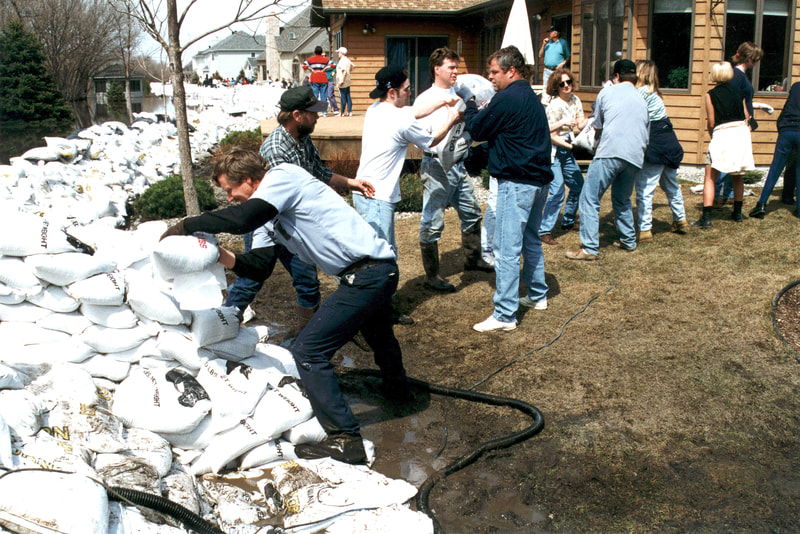|
In 1997 the Red River flooded. The high water came quickly and took with it basements and bridges, cars and cattle. It also washed away the fourth quarter of my freshmen year of college—at least the traditionally structured academic portion of it. Lately, as I navigate my social media, many seem concerned by how this shift to digital learning will impact our students. Will it stilt their academic growth? Will the class of 2020 be able to graduate? Will this added stress be manageable for our students who struggle with mental health issues? To be honest, I don’t know. But here is what I do know: I turned out okay. Fourth quarter my freshmen year was filled with sandbagging instead of sitting in classes. While the Concordia College campus stood on high enough ground for dorm life to remain virtually unchanged, roads were closed preventing professors from accessing campus. Water soaked into the basements of our professors’ homes, so they were no longer able to ensure that new ideas were soaking into our minds. Long before digital learning was even a possibility, classes were simply canceled. We’d wake up, brush our teeth but skip the shower (water was being rationed), and stumble across campus to class. On the board, we’d see:
For those few months, I didn’t learn through traditional course structures and assignments. Instead, I wrote an essay on the potential of community resiliency and mailed it to my professor, and although I never received feedback on the essay, I grew and fortified writing skills through the process of shaping that argument. Instead, I boarded school busses that took us to the banks of the river and we worked in assembly lines to create damns from sand, meanwhile we sang songs and tried out our own harmonies. Instead, I took a few shifts monitoring my Environmental Sciences Professor’s sump pump at night so she could grab some groceries for her and her young kids, maybe even sleep a few hours—and during those quiet hours of listening only to the whir-squish-whir of the pump, I read the newspaper and wrote poetry inspired by headlines. And, at the end of the year, for those classes that were able to come back together face-to-face, I found I was in an okay place. I wasn’t worse off for having had those few months off from structured learning. In fact, I may have been better for it. I learned to write for me, rather than for the feedback of my teachers. I learned how to create harmonies while working in harmony. I learned how to find inspiration in the peace that’s rooted in solitude.
And today, I’m still okay. I never had to write a final essay for that English class, yet I still had the foundational knowledge I needed to do well in my sophomore English course. I never had to take a rigid Aural Skills final, but if you give me a note I can still join you in harmony to create a perfect fifth. I never read the last few chapters of my Environmental Science textbook, but I did get to see the environment in action. Similar to our students today, while stuck in our rooms surrounded daily by the same people, we ordered mediocre pizza and ate in, we watched too many episodes of Friends on our TVs, and on sunny days we jumped at the chance to lounge around outside. Despite this, we still learned and grew. Eventually, pizza and TV and lounging gets old. Boredom takes over. But then, slowly at first, inspiration clicks in. Suddenly, we shift to writing letters by hand, to teaching ourselves how to make something other than Ramen Noodles with electric kettles, to reading classic novels that have been catching dust on shelves. Just wait—the shift is out there: it’s on its way. Not to mention, those of us who were college freshmen in the spring of 1997, we went on to be sophomores in the fall. Those who attended Moorhead High School—where I had volunteered as a Debate Judge the winter before—they went back to class in the fall, too. Those who had been seniors that year, the Concordia Class of 1997, graduated on time—despite some family members not being able to make it to the--much altered--ceremony. And today, decades later, we’re doing just fine (plus, we’ve got great stories to tell).
1 Comment
My husband and I don't have any children of our own. Then again, we chose that for ourselves in part because we each have more than 150 kids. Each year. Others call them our students, but they are more than that to us. And today, with only two days of warning, each of our kids left us. Maybe for only a few weeks. Maybe for longer. Covid-19 leaves too many unknowns.
Each year, I am used to saying goodbye. Seniors graduate. Sophomores become Juniors. Students change teachers at semester-time. But today was unlike any of those goodbyes. An ominous aura had crept in over the weekend—a frosty fog on a winter morning—stilting laughter and leaving hallways almost bare. I hadn’t felt so many heavy hearts in one building, so much palpable anxiety, since 9-11. And while some covered up their discomfort with, “I’m just gonna play video games and sleep,” others wore their anxiety openly. One student stopped by my room for a hug only to realize that hugging goodbye wasn’t an option in this era of social distancing. Another turned in a final essay that was supposed to be about Their Eyes Were Watching God, but that instead had a nugget buried within that read, “I’m going to miss you: I’m going to miss being around adults who care.” And another, after slathering her hands and arms in sanitizer, handed me a small handmade card that had only one, quite fancy, word inside: “Thanks.” It’s no surprise, really, that when others post on social media that at 'least they can spend some quality time with their family', I tear up. My family, as sappy as it may sound, is comprised of mainly my students. My family that is now being quarantined away from me. So, when students asked if I would help them turn some simple, optional journal entries into something more collaborative—like this website—I was quick to agree. I’m a sucker for anything that keeps me in touch with the teenagers in my family (just ask my husband: I’m on Snapchat constantly, staying in contact with my nieces). I’m sure many of them, at least until they read this, just assumed my willingness to serve as the editor-in-chief of this site was more about wanting to keep them learning and growing. While they’re not wrong in this assumption, they’ve missed my key motivator: I don’t know how to not stay connected to my family. |
AuthorThis portion of this site is written by Mrs. Lyke, your basic addicted-to-teaching teacher-type. ArchivesCategories |



 RSS Feed
RSS Feed
